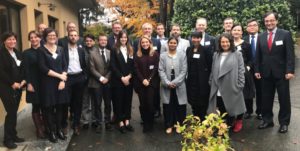Thinkers retreat at Villa la Collina, Cadenabbia, Italy, 23 to 25 November 2019, organized by DIE and the Konrad-Adenauer-Foundation

Thinkers and policy-makers from China, India, Indonesia, Brazil, Mexico and South Africa as well as from the European Union and international organisations engaged in a retreat-style policy dialogue on the future of multilateralism. Participants from DIE were Sven Grimm, Silke Weinlich, Christine Hackenesch and Wulf Reiners. Working with a scenario-building methodology, meant to prepare for possible futures, the group discussed drivers that will shape multilateralism to the year 2040.
The exchange of ideas and discussions took place in a retreat atmosphere in Cadenabbia, Lago di Como, Italy. Subsequently, some participants took the debate to the European level by meeting with policy-makers and think tanks in Brussels; for DIE, Sven Grimm presented the methodology and debates.
Agreement in the group was that, in the messier world of 2040, Europe will need to pragmatically cooperate with actors that are not amongst the like-minded in their outlook on the world, but are necessary partners to address urgent global issues. By 2040, the round agreed, climate change would result in warming up to an average of 3 degrees, which means that a number of ecosystems would have surpassed tipping points and would put existential challenges to humankind. Other drivers for the world in 2040 were discussed, inter alia, global power shifts, technology and the question who controls data, as well as a crisis of capitalism with rising inequalities.
No agreement was reached, though, when the question turned from what would be „the most likely“ to what would be „the most desirable“ scenario. While participants agreed on the (broad) idea of working towards the global common good, it was not clear that all discussants would want an institutionalised world of „thick multilateralism“, i.e. an institutionalised and open setting. The club scenario was also seen as a good option by some, which probably reflects the composition of the group, in which all participants came from states with substantial power resources. Follow-up of this work is to be developed by DIE’s research programme on Inter- and Transnational Cooperation, as a combination of work on the multilateral system and our Managing Global Governance (MGG) programme, involving key emerging powers.

Schreibe einen Kommentar